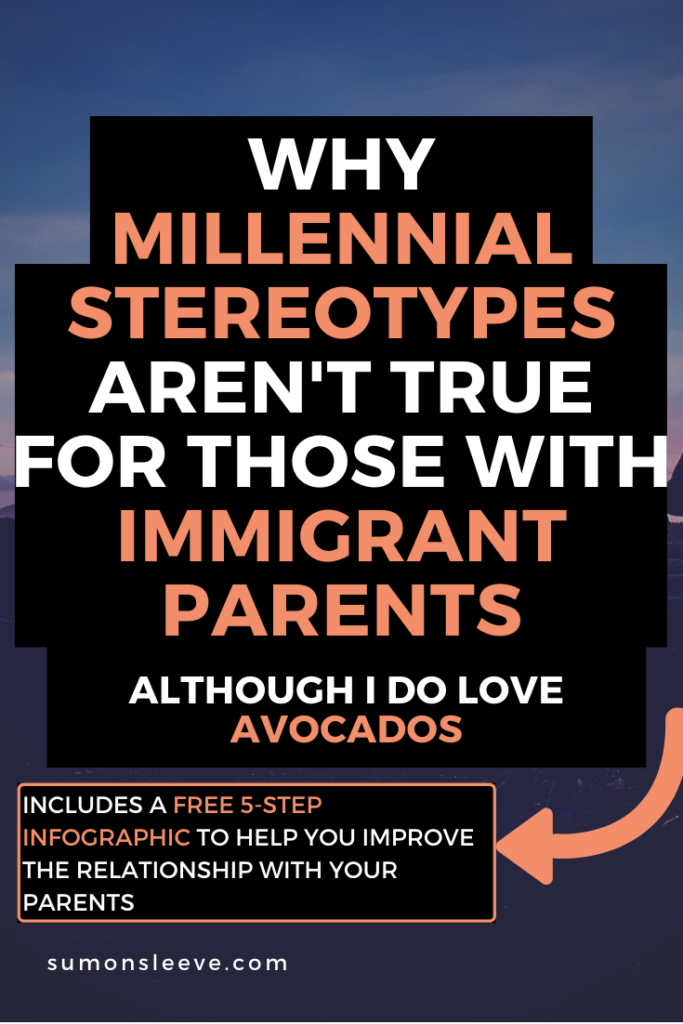Millennials are often stereotyped as lazy and entitled. How does growing up with immigrant parents prove those aren't true? Although, I do love my avocados…

“It’s because they’re Millennials”
I was born in the year of the Chernobyl disaster. For those who don’t know a lick of history, it’s 1986. I’m a Millennial and I’m proud to be part of an often misunderstood generation. Between the start of the ’80s and the mid-’90s is where it’s at y’all!
Perhaps it’s because I’m married with kids that folks assume I’m not part of this generation; however, I often have older people complain to me about the “lazy, entitled kids” they work with. They’ll scoff and grunt, “It’s because they’re Millennials” coupled with a look of disgust, expecting me to nod and agree.
I want to respond flatly,
“I’m a Millennial.”
But instead, I prefer to wait and see what other nonsensical bullshit spews out of their mouths.
Maybe they’ll start making other stereotypes that annoy me?
As a short, Asian female, there are lots they can choose from.
Attack!
I decided to do a quick search on ye olde Google to see the most frustrating stereotypes I could find and tell you why they’re not true from my lens as a Chinese Canadian who grew up with immigrant parents.
And here we go (in my maniacal, Joker-like voice):
Millennials expect rewards for every little thing they do because they were raised in a world of hand-outs and participation trophies
Really? Like really?
This one made me LOL IRL (Laugh Out Loud In Real Life…I had to spell it out for the ancient ones).
Just ask anyone who can relate to that “high expectations Asian dad” meme,
“Facebook?
Why don’t you face book and study?”
Oh boy do I wish I had an actual hand-out or a participation trophy. Or how about,
“Good job! I’m proud of you!”
When I went to school, there were no participation trophies. When our basketball team lost, we lost. The coach would give us pat on the back, tell us we’ll practice more and that we’ll get the next one.
The time I competed in the 100m dash and came in 1st didn’t mean I made it to the finals. It was based on my time compared to all the other students across the city; I was devastated I didn’t make the cut.
And it wasn’t like I was coming home to a participation party, to celebrate how I didn’t make it.
Growing up, my parents were stone-faced whether I got straight A’s, finished at the top of my class, won piano competitions, awarded scholarships for University or saved enough money from working part-time to pay for my own driving lessons. They were rarely impressed; it was like,
“Yup, of course, you’ll get top marks, awards and work hard to pay for your own things. We raised you. We expect nothing less.”
The few times they were, their reactions were subtle, and I had to really pay attention.
Recently, I appeared on the Vancouver Chinese news to talk about the recent racism that has resurfaced due to COVID and my book “How To Deal Asian Parents.” Instead of saying they were proud, my parents filmed their TV while the segment was on and sent me the videos, no words, just the attachment. And the next time we had a family dinner, my dad nonchalantly asked my sister whether she saw me on TV.
So no, I do not expect a reward for every little thing I do. It’s actually the subtle acts of appreciation that matter to me.
Millennials can’t afford to buy homes because they’re spending too much money YOLO’ing and FOMO’ing.
My mom taught me what a bank account, saving money and earning interest meant when I was barely 8 years old.
It’s 1994 and I have 20 $20 bills of red pocket money in my hands, eagerly waiting to spend it on candy and plastic toys. She explains,
“You can use this now and buy whatever you want but it will be gone until next Lunar New Year.
Or you can put this in a bank and they will pay you a little bit of money every month for keeping it there. You don’t have to do anything. You just have to wait and you make money. You can take your money out anytime you want.”
The following day, we go to the bank and I opened up my first savings account. That $400 contributed to the downpayment of my first home that I purchased in my mid-20’s.
I’ve been working since I was 14 years old, starting out as a French and Math tutor then as a barista throughout highschool. I worked throughout my undergrad studies and grad studies. Saving money is the bread and butter of what my parents taught me. And it’s paid dividends over the years (not just literally but also figuratively).
My parents raised me to be frugal, resourceful with a “waste not, want not” mentality. Survival, making ends meet and providing food and shelter were what my parents focused on. They believed in owning your home because what you own is yours to keep and do as you please.
Whether you flip it and invest the profit for another property, rent it out for passive income, pass it onto your kids or live in it until you die, buying a home is where you can start creating generational wealth because it meant you’ve put roots down and the tree can only grow bigger for the next generations.
They wanted their kids to have it better than them, to struggle less, to not worry as much about money as they did and owning a home was a conservative approach to preserve your assets. They preached on and on about how much their mortgage was and how many years it will be before it was paid off.
I still remember the day they put in their last payment; my parents were overjoyed. At family dinner that night, they celebrated in stereotypical Asian parents style. They casually announced,
“So we really own this house now.”
And dinner resumed as normal.
So no, I’m not YOLO’ing my money on expensive trips, designer handbags, Louboutins, luxury cars and weekly salon trips. I’m making my payments like a responsible adult.
Millennials hold a sense of entitlement and need to feel special
“Look at me! Give me attention!”
“I’m a special, little snowflake.”
“The world revolves around me.”
I spent my childhood in a predominantly Caucasian neighbourhood.
When you grew up looking differently, speaking differently, acting differently, feeling like you never really fit in, you don’t want to feel special. You just want to blend in, to be treated like everyone else.
And immigrant parents often taught their kids to put their heads down, to not get in trouble, to not stand out, to not ask for more, to take what you get, keeping it straight and narrow. They’re risk-averse because they’ve sacrificed so much to get to where they are that they’re afraid any mistake will make all that effort go to waste.
Unfortunately, that longing to belong made me less inclined* to speak up and out, asking for things that I actually deserve and entitled to.
*From writing this blog, recording podcasts and videos, I’m working on getting my voice heard.
So it’s like I’m at the opposite end of entitlement, as though I’ve put myself in an underprivileged position…
Wait a second…is that me or white privileged society that put me there? Perhaps a debate for another time.
Millennials are more focused on their life outside of work than their careers and so they slack off at their job.
Work hard, play hard…
Wait, what play? More like work hard, work harder; hard work begets more work.
We all know (or are one of those) a stereotypical Asian kid who isn’t just gifted academically but also a talented violinist, figure skater, sculptor, volunteering at senior homes and helping out at the family-owned restaurant. Their work ethic is impeccable; it’s like they don’t have time to dick around.
Becoming a doctor or lawyer was what many immigrant parents wanted their kids to strive for. They were safe career choices that made lots of money but required many years of schooling, numerous exams, dedication and commitment. And many hardworking Millennials followed that path and push their limits every day, busting their butts to make their parents and ancestors proud.
Personally, for most of my life, I was one of those kids, just replace violin with piano. All I cared about was school and work. I wanted to climb the corporate ladder and to be honest, I didn’t have any hobbies. Whenever there were deadlines to meet, I met them. I checked the boxes, dotted my I’s and crossed my T’s. I was a go-getter with incredible discipline.
So for this stereotype, I was actually the opposite of it until I became a mother. Then the pendulum started to swing. It’s not like I’m more focused on my life outside of work, it’s more like I finally realized what really mattered, that there’s more to life than work, that both can be important.
Then when I re-discovered my passion for writing, the dream of pursuing that as a career meant I could have my cake and eat it too. Ask any working mother who is actively making strides towards their goals and you will know they are efficient and focused beasts, no diddle-daddling.
Millennials constantly seek validation and praise
Asking for praise and validation for my efforts is like pulling teeth. It’s because getting a pat on the back or receiving kudos wasn’t something I was taught to value. So to ask for it is unnatural because the result is unwanted.
Whenever someone gives me a compliment, whether it’s about my work or the way I look, I get uncomfortable. My first instinct is to downplay, then deny and then to think of something great about the other person as an attempt to deflect the attention off of me.
Deflecting praise is part of how I was raised. Growing up as an Asian Canadian, it’s disrespectful to confidently accept a compliment without saying something nice about the person complimenting you. You have to deny their comments as though you aren’t as good as they say you are, that they are better and you don’t deserve their kind words.
Asking for validation from my parents was like a shot in the dark. I’d either miss the target and they wouldn’t understand what I was trying to ask for, brushing me off. Or I’d shoot myself in the foot and they’d say something that completely undermined my accomplishment, hurting my feelings.
Therefore, I’ve been conditioned to refrain from asking but this is something I’m trying to change. I’m learning how to seek validation and feedback as I think this is important for building self-awareness, especially on an emotional level.
Millennials don’t want to get married and have kids.
Immigrant parents are notorious for trying to set their kids up with anyone they know who is young and available and once they get married, it’s about having grandkids.
“My friend has a son who is a doctor.”
“You’ll know how it is when you become a parent.”
“You need to settle down in one place and start a family.”
“A rolling stone gathers no moss.”
“Get a good-paying job so you can provide for your spouse and kids”
“How long have you been dating? When are you getting married?”
I can see how Millennials may not want to settle down. Marriage doesn’t have to be the social norm anymore. And making a decision about whether to have kids isn’t easy for many Millennial women.
However, getting married, having family values, creating the next generation are ingrained in who I am; I’ve known I wanted kids since I was a kid. Watching my parents lean on each other throughout the decades of their marriage inspires me to continue working on mine. And I’m preserving those values with my kids, with the hopes that they also end up getting married and granting me some grandchildren.
Millennials don’t vote.
It is a privilege to vote as a woman of colour; it’s not something I take for granted. My parents immigrated to Canada so I could have a better future and I am eternally grateful for having the opportunity to have a voice in how the country is run.
I’m proud of where I came from and to this day, I have never missed an election, local, provincial or federal. I have exercised my right as a Canadian citizen since my 18th birthday and will be continuing this until the day I die.





